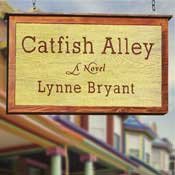Author Lalita Tademy describes Mississippian Lynne Bryant's debut novel "Catfish Alley" (New American Library, 2011, $14) as being "In the tradition of 'The Help,'" by Kathryn Stockett. True, both Mississippi authors have white women as central characters and black women struggling against racial hatred. Both novels have multiple perspectives. That's where they diverge.
I much prefer Bryant's novel. Her plot is more complex and robust, and her characters more fully developed. Bryant sucks readers into the vortex of 1930s Mississippi with the proficiency of a time machine.
"Catfish Alley" is brave and visceral, exploring ground "The Help" fears to tread. "The Help" develops the vapors when broaching the subject of racially motivated violence, sugarcoating the harsh realities and fleeing the scene to deal with hair issues. Bryant's "Catfish Alley" fearlessly captures love, lies, violence, betrayal and lives interrupted.
This is not a feel-good novel for white people. It is an honest look at subtle forms of southern racism and an accurate glimpse into its uglier, more blatant origins. Bryant's characters manage to make lives in a place that does not want them.
Set in fictitious Clarksville, Miss., a haven of registry-listed antebellum plantations, Roxanne Reeves restores historic homes and directs the town's pilgrimage tour. She's an image-obsessed social climber with a secrets: She comes from a poor family, and she and her pedigreed husband are separating.
"Was I so attracted to him because he never challenged me or my story? He was willing to swallow completely that I was an orphan adopted by the Stanleys, the wealthy couple Mama cooked for. And I was willing to play the role of the perfect faculty wife—the right social circle, the right clothes, the right clubs," Reeves says, grappling with her life.
The owner of a home Reeves is panting to restore tasks her with developing a black history tour and Reeves enlists Grace Clark, a retired black schoolteacher, to help.
"I need Grace to be a consultant for this tour, but I just cannot bear her droning on and on about slavery and civil rights and all of that," Reeves narrates.
Clark is equally reticent. "Sets my teeth on edge a little bit thinking of the show they put on every year. ... Now this all-white committee has decided there should be a tour about the black folks."
As the women soldier on, Reeves finds a vibrant community she never realized existed. She meets Grace's friends, and their stories weave together into a tapestry of collective life experience. At the center is violence act that tears lovers apart and alters lives.
Bryant paints a well-researched picture of life in the 1930s South and deals honestly and sensitively with racial bias. At its root, "Catfish Alley" teaches that forgiveness restores and love eclipses hate. It is an absorbing read, worthy of adapting to the big screen.



Comments
Use the comment form below to begin a discussion about this content.